Drew Myron's Blog, page 52
May 15, 2014
Thankful Thursday: Lost & Found
 Getting Lost, a write-over poem by Drew Myron.
Getting Lost, a write-over poem by Drew Myron.
Well, isn't this a nice surprise? My poem about getting lost is getting found.
Getting Lost, a write-over poem I created during National Poetry Month, was recently published in the Eugene Register Guard newspaper.
Many thanks to Brian Juenemann, of the Pacific Northwest Booksellers Association, for using his monthly column to shine light on Oregon's literary landscape.
And because everything comes from what came before, a nod to that tattered Rudyard Kipling tome that I write over and upon, and to Rebecca Solnit's A Field Guide to Getting Lost, whose words circle my head.
It's Thankful Thursday, a weekly pause to express appreciation for people, places, things and more. What are you thankful for today?
May 12, 2014
Dear Young Writer,
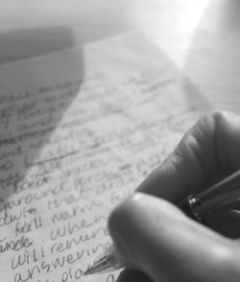 When I say Write me a letter, I'm asking to see you.
When I say Write me a letter, I'm asking to see you.
To meet at a place on the page in which we hover above our lives, seeing with clarity who we are and the capacity we carry.
I want to see you. Not How are you, I am fine, but the real version of yourself. Let's have a conversation, slowed and real, in which we talk to each other by talking to ourselves.
How are you?
It's the first question and the last. It's the start to finding the buried treasure, the buried you, beneath the barrier and disguise, the hurts and worries, all the secrets and shame.
How am I?
All of us are small and uncertain, clouded and confused. You know this, don't you? Each of us struggles and hurts and hides. You feel more than the smooth surface of life, and still you cannot yet grasp how deeply we are each of us knitted together in our aloneness.
My dear, young friend, I am writing you a letter. In every line, I'm looking for you.
With love,
Drew
May 8, 2014
On Tour: What's your writing process?
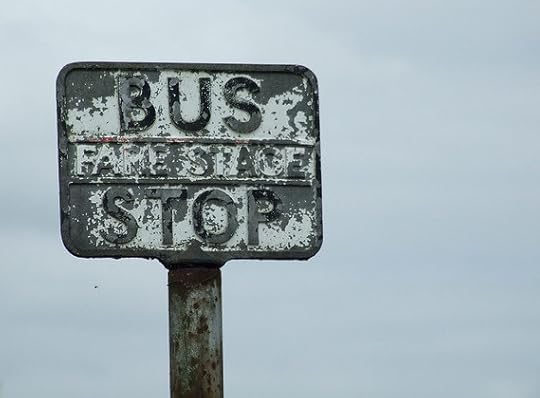 The blog bus rolled into town and stopped at my front door.
The blog bus rolled into town and stopped at my front door.
My Writing Process Blog Tour is a four-question quiz that gives writers the chance to blab about themselves, and readers the chance to meet writers (and peek into some not-so-private writing lives).
Please hop aboard and indulge me as I ask & answer:
1.
What are you working on?
The world is full of words and I'm trying to live — and write — within these tenets:
Is it kind? Is it helpful? Does it add to the silence?
This is tricky. Answering honestly leaves little room for banter and blather, and a lot of room for crickets. Fortunately, I like the quiet. But, oh, you meant, what are you working on, as in writing? Ummm, the same recipe applies.
2.
How does your work differ from others in its genre?
Every writer carries their own history and approach. In this sense, every writer is unique. And yet, nothing is new. Every story and poem, every painting and product, wears the beauty and scar of everything that came before. Nothing is new, so everything is new.
On a more practical level, I'm a reporter-publicist-poet, which makes for a writer who is deadline-driven, story-focused and tender-hearted. And I favor searchers and seekers, the broken and lost — people with art and grit.
3.
Why do you write?
I write to make sense of the clamor. I crave clarity, the stretch of finding my way from head to heart to hand. The act of writing is compulsion and companion, and almost always sweet relief.
4.
What is your writing process?
Resist, retreat, react, scratch, stir, sift, sort, give up, give thanks, breathe, repeat.
Blog Tour Backstory: The writing world is so vast, yet so small, and sometimes we're all in this soup together.
I was kindly invited to go "on tour" by poet Jessica Goodfellow, author of The Insomniac's Weather Report, a poetry collection enjoying a recent re-issue. Jessica shares poetic insights and ideas on her blog, Axis of Abraxas.
Now, the tour bus rolls merrily along with stops at the writers I've invited. Go forward. Do not stop, swerve or slow. Drive ahead to meet Amber Keyser, writer of fiction and nonfiction for tweens, teens and adults; and Sarah Sloat, sly and wry editor and poet.
May 6, 2014
Thanks for playing!
 Poems are written, names are drawn, and National Poetry Month comes to a full, exhausted close. Thanks for playing with me, and thanks for reading, writing & appreciating poetry.
Poems are written, names are drawn, and National Poetry Month comes to a full, exhausted close. Thanks for playing with me, and thanks for reading, writing & appreciating poetry.
Winners of the 2014 Big Poetry Giveaway are Linda H. and Brian Wong.
And, yes, we're all winners when we express ourselves. Write on!
May 1, 2014
Love that line!
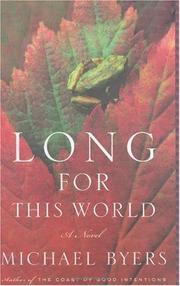 Now ninety, Freda
Now ninety, Freda
has not slowed much,
just become smaller, more
sinewy, like a carrot
left in the back of
the refrigerator.
- from Long For This World
a novel by Michael Byers
April 27, 2014
Fish Tales
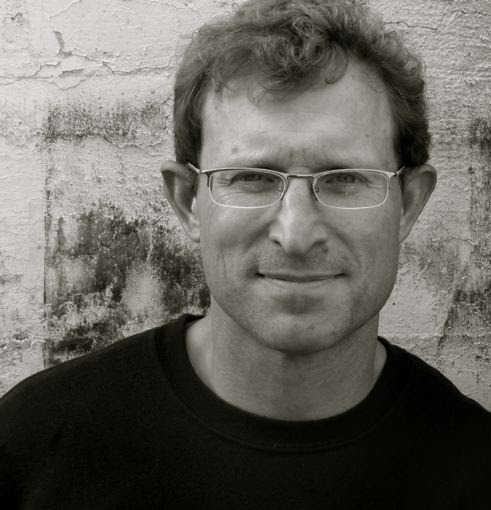 Henry Hughes — poet, professor, fisher
Henry Hughes — poet, professor, fisher
"Many of our greatest
authors have found in fishing
some of life’s happiest
and most painful
moments."
— Henry Hughes
From 3 Good Books, a series in which I ask writers and artists to share their favorite books on a given theme. Go on, head over to Push Pull Books to read 3 Good Books.
April 24, 2014
Thankful Thursday: Poem in Your Pocket
 Oh, what delight! The convergence of my favorite days: Thankful Thursday and Poem in Your Pocket Day.
Oh, what delight! The convergence of my favorite days: Thankful Thursday and Poem in Your Pocket Day.
Created by the Academy of American Poets as part of National Poetry Month, Poem in Your Pocket Day encourages you to carry a poem and share it with others.
Call me a sap but I enjoy a designated opportunity to share poetry. On this Thankful Thursday, I sing the praises of poems carried, clutched, and shared.
Here's an old favorite. Over the years, each time I read the poem I appreciate it in a deeper way. I like this about poetry: the words do not change but the experience I bring to a poem changes. Sometime we grow into, and with, a poem.
Sweetness
for my mother
Just when it has seemed I couldn't bear
one more friend
waking with a tumor, one more maniac
with a perfect reason, often a sweetness
has come
and changed nothing in the world
except the way I stumbled through it,
for a while lost
in the ignorance of loving
someone or something, the world shrunk
to mouth-size,
hand-size, and never seeming small.
I acknowledge there is no sweetness
that doesn't leave a stain,
no sweetness that's ever sufficiently sweet . . .
Tonight a friend called to say his lover
was killed in a car
he was driving. His voice was low
and guttural, he repeated what he needed
to repeat, and I repeated
the one or two words we have for such grief
until we were speaking only in tones.
Often a sweetness comes
as if on loan, stays just long enough
to make sense of what it means to be alive,
then returns to its dark
source. As for me, I don't care
where it's been, or what bitter road
it's traveled
to come so far, to taste so good.
Gratitude. Appreciation. Praise. Please join me for Thankful Thursday, a weekly pause to give thanks for people, places, and things in our lives. What are you thankful for today?
April 19, 2014
Fast Five with Gail Waldstein
I believe in telling the total
emotional truth, or as much
of it as I can clasp.
Because a few questions can lead to endless insight, I'm happy to present Fast Five — interviews with my favorite writers.

Gail Waldstein is author of To Quit This Calling, a memoir of her 35 years as a pediatric pathologist, and Afterimage, a poetry chapbook. Her stories, essays and poems have won numerous awards and have appeared in New Letters, Carve, The Potomac Review and many other journals. An excerpt from Mind Riot, a memoir about her disintegration into schizophrenia, is available to read at Solstice Literary Review. She lives in Denver, Colorado.
As a pediatric pathologist you routinely conducted autopsies on dead children, as well as diagnosing leukemia and brain tumors on very sick children. How did your career choice impact your creative life?
I had always wanted to write and a few years after a grueling internship in pediatrics, ’68-69, when I also gave birth to my first child and worked every-other-night for the rest of that year, I did write about that and was published in the early ‘70s. By then I had two more babies and my marriage was fragmenting. I was divorced in ‘76. I put aside all hopes of writing then, continued in pediatric pathology full time and solo-raised three children for fifteen years.
The truth of what I did daily in the morgue, the operating room, at the surgical bench and microscope, diagnosing tumors in babies and children drained my humanity. Said another way, in order to stay reasonably sane I shut down empathy and worked, wrote medical articles, book chapters and never accepted career advances that would require working evenings, which were dedicated to being home with the children.
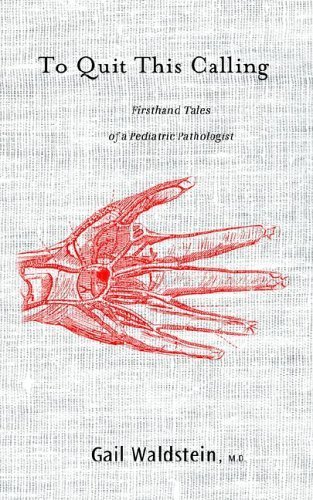 “Creative” for me during those super-busy years equaled crocheting, cooking, embroidery. I kept a journal, always have, but didn’t venture into serious writing again until a poem seized me in the early ‘90s, when I pulled over, parked and wrote. By then the children were off at college or into early careers and I was remarried, another adventure that was going to hell. I continued in pathology, but increasingly found that the armor I had to wear to muscle through the surgeries and autopsies was diametrically opposed to my being able to peel my skin off and write from a raw place, which is how I wanted my work to be. I want to move a reader’s heart, to create in them the emotions that sweep us, almost slay us, move us deeply. Eventually, this dichotomy between how I had to present myself, and how I wanted to be caused (or contributed to) several severe diseases. Later, after lots of drugs, surgeries and wrestling with part time work, I quit medicine, primarily because of rheumatoid arthritis. Economically, an insane decision, but personally fulfilling and the right thing for my writing and my body. It took a few years before I noticed my body had begun to unclench, cells were breathing again.
“Creative” for me during those super-busy years equaled crocheting, cooking, embroidery. I kept a journal, always have, but didn’t venture into serious writing again until a poem seized me in the early ‘90s, when I pulled over, parked and wrote. By then the children were off at college or into early careers and I was remarried, another adventure that was going to hell. I continued in pathology, but increasingly found that the armor I had to wear to muscle through the surgeries and autopsies was diametrically opposed to my being able to peel my skin off and write from a raw place, which is how I wanted my work to be. I want to move a reader’s heart, to create in them the emotions that sweep us, almost slay us, move us deeply. Eventually, this dichotomy between how I had to present myself, and how I wanted to be caused (or contributed to) several severe diseases. Later, after lots of drugs, surgeries and wrestling with part time work, I quit medicine, primarily because of rheumatoid arthritis. Economically, an insane decision, but personally fulfilling and the right thing for my writing and my body. It took a few years before I noticed my body had begun to unclench, cells were breathing again.
The story of your health is story itself. You’ve survived cancer of the cervix, rheumatoid arthritis, and schizophrenia (for which you were treated in a mental institution). Do you consider writing a form of therapy?
Absolutely NOT.
I have been asked that question many, many times or told that my writing is therapeutic, that it’s so confessional and out-there that it must bring closure or relief or healing. And while writing, the way I approach it is very interior, visceral and (hopefully) deep, it is not therapy.
I was in intense psychotherapy after my hospitalization at age 30 for three years. That experience was painful, self-revealing, transformative. I have been blessed not needing psychiatric drugs afterward, but I remain connected to therapy and assume I will return for “mini-fixes” forever. While it’s easier now, having lived with my disease for decades, and recognizing danger and mental disorder faster than ever, I can say that the worst day of writing, when I’m stalled in front of a legal pad or computer, desolate and dry, the most difficult dark places I visit in my work, the most eviscerating confessions I decide to expose, is like eating a thick slice of chocolate cake compared to those early years of therapy. There is no comparison.
You are a later-in-life writer. How did you come to writing?
I am definitely a late-life writer, but as I said earlier, it was something I always wanted to do. I read poetry and novels in med school, sometimes secreted paperbacks inside medical texts. I would’ve graduated higher in my class had I read more medicine, no doubt, but I majored in both English Lit and Biology in college, and I desperately missed literature in the sterile, memorization-oriented sphere of medical school.
My writing began as my second marriage was crumbling. I saw lovers kissing on a Denver street in a snow storm and it reminded me of my first kiss and I wrote what I saw, what it renewed in my body. That opened some connection with the muse, some daring. I had always wanted to write about my hospitalization and had made weak stabs over the years. In the mid-90s, as more poems, stories and essays arrived, I began work on my book, Mind Riot, which I’m still wrestling.
You write in many forms: essay, poetry, short story, memoir. Which came first, and what does one form offer that another doesn’t?
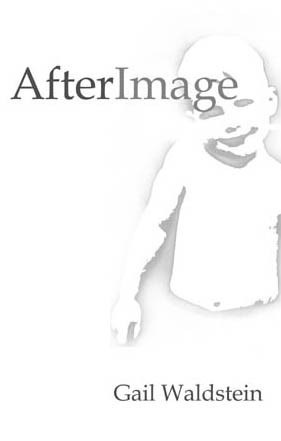 Poems came first, and still, if I’m lucky enough to feel one bubbling up, I stop whatever I’m doing and write. It’s not automatic writing, but I do want to honor the impetus.
Poems came first, and still, if I’m lucky enough to feel one bubbling up, I stop whatever I’m doing and write. It’s not automatic writing, but I do want to honor the impetus.
Prose writing is more work, more struggle, more muscular for me. Not that I don’t work hard on my poetry, I do, but the end is always close, the rhythm set, the music compact. For prose I try to remember Ron Carlson’s advice, where in the body does this happen and write toward that. I have a erratic approach to writing (as do most women writers). I may see a shape, a floating color, a locale where I realized something novel, a vision of a loved one in a particular slant of light, an argument, and that starts things. I don’t read for plot and if it shows up in my work, great, but I’m not primarily interested in it. Occasionally I think I know where I’m going, but I don’t outline. I think the delight of “first writes” for me is discovery and planning would ablate that.
As I reread an ugly first draft, I’ll see ten or twenty pages without a single scene. Revision time. It took me many years to learn that revision is not simply editing, but seeing the whole piece anew. I now love revision as much as a fresh start, which I never thought I’d say.
I realize in rereading your question I haven’t answered what form offers what. That’s probably because in pathology I considered myself a “lumper,” not a “splitter.” I saw similarities between tumors; I noted the dance of malignant cells and their relationships, and found that more interesting than individual characteristics that subcategorize and define individual malignancies. I certainly could and did break things into small cubby-holes; that was my job, my career. But I’m not sure I ever subscribed to the concept that such minute distinctions were as important as medical professionals insisted.
I feel the same way about prose. I’m not a strict nonfiction MUST be TRUE kind of woman. I believe in telling the total emotional truth, or as much of it as I can clasp, but I often have no idea whether I’m writing memoir, short story or creative nonfiction. And to add to my personal confused philosophy, many of my pieces, which invariably contain autobiography, have won awards in two or three of these “classifications.”
(I first read this question as to what informs my work, so as a “bonus,” I’ll leave what I wrote to answer this unasked question: My obsessions inform my writing, love and its foibles, observed and experienced, is a theme I come back to often. My long exposure to medicine and my experiences in it as a doctor and then a patient colors my work and infuses my vocabulary. Feminism is also woven deeply in my writing.)
For many years you served as a creative writing mentor for Denver Public Schools (earning teacher of the year in 2003), and also taught at the college level. I have been the beneficiary of your insightful and incisive editing. What do you find turns a piece from ordinary to extraordinary (and how do we do it?!)
If I could answer that, I’d win some prize. There’s something about the strength of truth that hits the reader in the gut. I know it when I see it, the old Supreme Court comment about pornography, applies. You feel it in your cells, you gasp, your nose starts running and you know you’re about to cry. Sometimes pretty prose alone, the music of it, catches my breath, or a strange, mystical image; sometimes it’s a peculiar juxtaposition, two ideas that are unrelated are mashed together and I’m forced to rethink reality. As far as I know there is no simple rule for making writing extraordinary. Except, maybe the old saw, How does one get to Carnegie Hall? Practice, practice, practice.
I do know though, that without risk there is little but ho-hum. You hear risk easily in humor, people have to go over the edge, insult or offend (and often apologize), but without the courage to try something wild and new, there’s no extraordinary, just rehash.
I encourage that risk-taking in writers all the time. A lot easier if I don’t have to do it myself. But of course, I try and make myself tell the absolute truth, the fullness of what happened and what an idiot I was, or how base and mean and petty I was. I think we all need to tell the full truth as best we can. I believe writers are obligated to show pimples, prejudice, injustice, corruption, at least on the page, and hopefully kindness and perhaps redemption, or at least an inclination to reform.
I still teach and mentor in the public schools, now through a program run at Lighthouse Writers Workshop and when I get something from a student that evokes a visceral reaction I try and let the reaction show. I applaud these young artists who exhibit courage, and am humbled and inspired by their fertile, fervent minds.
Bonus Question: I’m a word collector, and encourage writers to gather words with interesting textures, sounds and significance. What are your favorite words?
yes, love, hope, simple, laughter, truth, courage, writing, grace, chocolate
April 17, 2014
Thankful Thursday: Cheap Joy
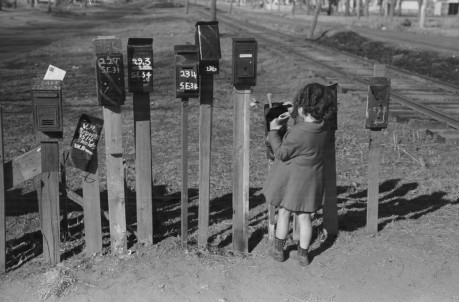 Dear Stranger. Write a letter, get a letter.
Dear Stranger. Write a letter, get a letter.
It doesn't take much to make me happy. This week I bought joy for two bucks. Not Trader Joe's Two-Buck Chuck but a more sober sort of happiness: a daffodil bunch for just $1.99.
It's Thankful Thursday, let's recount a week of simple, low-cost, high-reward pleasures:
Chopped Salad. Why does salad taste so much better when someone else makes it? And when it's cut into bite-size pieces?
Pentel Sign Pen. They've got good glide, backed with heft. Oh, how I love these black marker-pens.
Affordable Health Insurance. Better coverage, lower price. This self-employed asthmatic is grateful.
Dear Stranger. Oregon Humanities is bringing back the penpal. You write a letter, and get one in return. So old-school and cool. How are you? I am fine.
Sunshine. A slice, a sliver, a sunbreak. I'll take any scrap of light.
Please join me for Thankful Thursday, a weekly pause to express appreciation for the big things, the small fries, and all the inbetweens. What are you thankful for today?
April 14, 2014
Are you rain or shelter?
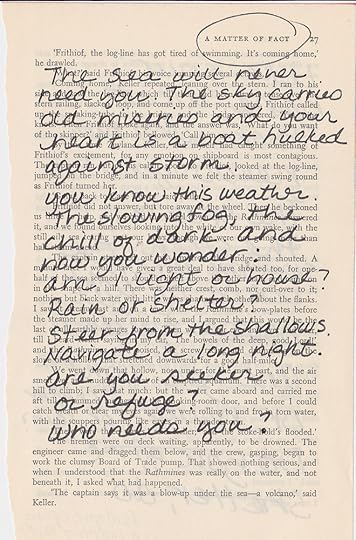 A Matter of Fact, a write-over poem by Drew Myron
A Matter of Fact, a write-over poem by Drew Myron
We're halfway through National Poetry Month. How are you celebrating?
I've been doing write-overs, sorta like a do-over. I just tear a page from an old thrift store book, gently glaze through the words, and then write my own. No intention, no direction, just wandering — with a solid literary foundation to prop me up.
I just love the line: "The sea will never need you" — from Mary's Son, appearing in The Collected Poems of Rudyard Kipling. Bless his heart, Rudyard Kipling is taking me across hill and dale, sea and sky.
So, where is writing taking you?



